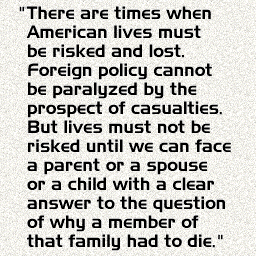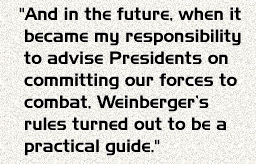"On October 23, six days after Bud
McFarlane became National Security Advisor, I received another
middle-of-the-night call from the National Military Command Center.
This time there was no question about alerting Weinberger
immediately. A terrorist truck bomb had struck a U.S. Marine barracks
at the airport near Beirut, Lebanon. Again, the news came out in
dribbles. Each time, I had to convey the mounting horror to a Defense
Secretary who I knew was squeamish about death. On taking over his
Pentagon office, Weinberger had gotten rid of a portrait of James
Forrestal, the first Secretary of Defense, who had taken a suicide
plunge from the Bethesda Naval Hospital. Weinberger replaced
Forrestal's picture with a rosy Titian on loan from a Washington
museum. This night, each of my calls was like a physical blow to the
Secretary. Eighty bodies pulled out. A hundred. A hundred and fifty.
In the end, the toll reached 241 Marines dead. A near-simultaneous
terrorist attack at a barracks in downtown Beirut killed
seventy-seven French soldiers.
Our Marines had been stationed in Lebanon for the
fuzzy idea of providing a "presence." The year before, in June 1982,
the Israelis had invaded Lebanon in one final push to drive out PLO
terrorists. This move had upset the always precarious Middle East
balance. The United States, consequently, was attempting to referee
the withdrawal of all foreign troops from Lebanon. The Marines had
been deployed around the Beirut airport as what State Department
euphemists called an "interpositional force." Translation: The
Marines were to remain between two powder kegs, the Lebanese army and
Syrian-backed Shiite units fighting it out in the Shouf Mountains.
Weinberger had opposed the Marines' involvement from the start, but
lost the policy debate in the White House to McFarlane and Secretary
of State George Shultz.
I was developing a strong distaste for the
antiseptic phrases coined by State Department officials for foreign
interventions which usually had bloody consequences for the military,
words like "presence," "symbol," "signal," "option on the table,"
"establishment of credibility." Their use was fine if beneath them
lay a solid mission. But too often these words were used to give the
appearance of clarity to mud.
On August 29, before the airport truck bombing, two Marines
had been killed by Muslim mortar fire; on September 3, two more, and
on October 16, two more. Against Weinberger's protest, McFarlane, now
in Beirut, persuaded the President to have the battleship U.S.S. New
Jersey start hurling 16-inch shells into the mountains above Beirut,
in World War II style, as if we were softening up the beaches on some
Pacific atoll prior to an invasion. What we tend lo overlook in such
situations is that other people will react much as we would. When the
shells started falling on the Shiites, they assumed the American
"referee" had taken sides against them. And since they could not
reach the battleship, they found a more vulnerable target, the
exposed Marines at the airport.
 What I saw from my perch in the Pentagon was
America sticking its hand into a thousand year-old hornet's nest with
the expectation that our mere presence might pacify the hornets. When
ancient ethnic hatreds reignited in the former Yugoslavia in 1991 and
well-meaning Americans thought we should "do something" in Bosnia,
the shattered bodies of Marines at the Beirut airport were never far
from my mind in arguing for caution. There are times when American
lives must be risked and lost. Foreign policy cannot be paralyzed by
the prospect of casualties. But lives must not be risked until we can
face a parent or a spouse or a child with a clear answer to the
question of why a member of that family had to die. To provide a
"symbol" or a"presence" is not good enough.
What I saw from my perch in the Pentagon was
America sticking its hand into a thousand year-old hornet's nest with
the expectation that our mere presence might pacify the hornets. When
ancient ethnic hatreds reignited in the former Yugoslavia in 1991 and
well-meaning Americans thought we should "do something" in Bosnia,
the shattered bodies of Marines at the Beirut airport were never far
from my mind in arguing for caution. There are times when American
lives must be risked and lost. Foreign policy cannot be paralyzed by
the prospect of casualties. But lives must not be risked until we can
face a parent or a spouse or a child with a clear answer to the
question of why a member of that family had to die. To provide a
"symbol" or a"presence" is not good enough.
Then, later in his book... future implications on military intervention (page
292-293)
I knew that Weinberger, for all his outward
self-possession, had been deeply troubled by the tragic bombing of
the Marine barracks in Beirut. I did not realize how deeply until a
singular draft document came out of his office. He asked me to take a
look at it and circulate it to the administration's national security
team. Weinberger had applied his formidable lawyerly intellect to an
analysis of when and when not to commit United States military forces
abroad. He was put off by fancy phrases like "interpositional forces"
and "presence" that turned out to mean putting U.S. troops in harm's
way without a clear mission. He objected to our troops being "used"
in the worst sense of that word. He had come up with six tests for
determining when to commit American forces.
Weinberger's antagonist, George Shultz, was dismissive of Cap's
approach. I had watched the irony of their squabbling for months. The
Secretary of State was often ready to commit America's military
might, even in a no-man's-land like Lebanon. What was the point of
maintaining a military force if you did not whack somebody
occasionally to demonstrate your power? On the other side was the man
responsible for the forces that would have to do the bleeding and
dying, arguing against anything but crucial commitments.
Not only did Weinberger want to sell his guidelines inside the
administration; he wanted to go public that summer. We started
considering possible speaking platforms, but White House political
operatives nixed any such controversial speech until the presidential
election was over. After Reagan's reelection, Weinberger addressed
the National Press Club on November 28. I went with him to hear him
describe the tests he recommended "when we are weighing the use of
U.S. combat forces abroad."
(l) Commit only if our or our allies' vital interests are at
stake.
(2) If we commit, do so with all
the resources necessary to win.
(3) Go in only with clear political
and military objectives.
(4) Be ready to change the
commitment if the objectives change, since wars rarely stand
still.
(5) Only take on commitments that
can gain the support of the American people and the
Congress.
(6) Commit U.S. forces only as a
last resort.
 In short, is the
national interest at stake? If the answer is yes, go in, and go in to
win. Otherwise, stay out.
In short, is the
national interest at stake? If the answer is yes, go in, and go in to
win. Otherwise, stay out.
Clausewitz would have applauded. And in the
future, when it became my responsibility to advise Presidents on
committing our forces to combat, Weinberger's rules turned out to be
a practical guide. However, at the time of the speech, I was
concerned that the Weinberger tests publicly proclaimed, were too
explicit and would lead potential enemies to look for
loopholes."


 What I saw from my perch in the Pentagon was
America sticking its hand into a thousand year-old hornet's nest with
the expectation that our mere presence might pacify the hornets. When
ancient ethnic hatreds reignited in the former Yugoslavia in 1991 and
well-meaning Americans thought we should "do something" in Bosnia,
the shattered bodies of Marines at the Beirut airport were never far
from my mind in arguing for caution. There are times when American
lives must be risked and lost. Foreign policy cannot be paralyzed by
the prospect of casualties. But lives must not be risked until we can
face a parent or a spouse or a child with a clear answer to the
question of why a member of that family had to die. To provide a
"symbol" or a"presence" is not good enough.
What I saw from my perch in the Pentagon was
America sticking its hand into a thousand year-old hornet's nest with
the expectation that our mere presence might pacify the hornets. When
ancient ethnic hatreds reignited in the former Yugoslavia in 1991 and
well-meaning Americans thought we should "do something" in Bosnia,
the shattered bodies of Marines at the Beirut airport were never far
from my mind in arguing for caution. There are times when American
lives must be risked and lost. Foreign policy cannot be paralyzed by
the prospect of casualties. But lives must not be risked until we can
face a parent or a spouse or a child with a clear answer to the
question of why a member of that family had to die. To provide a
"symbol" or a"presence" is not good enough. In short, is the
national interest at stake? If the answer is yes, go in, and go in to
win. Otherwise, stay out.
In short, is the
national interest at stake? If the answer is yes, go in, and go in to
win. Otherwise, stay out.